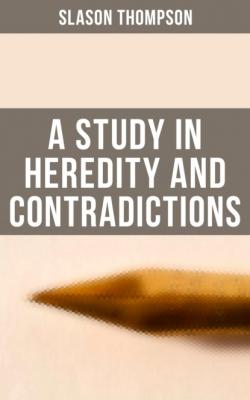A Study in Heredity and Contradictions. Slason Thompson
Читать онлайн.| Название | A Study in Heredity and Contradictions |
|---|---|
| Автор произведения | Slason Thompson |
| Жанр | Изобразительное искусство, фотография |
| Серия | |
| Издательство | Изобразительное искусство, фотография |
| Год выпуска | 0 |
| isbn | 4064066380717 |
Slason Thompson
A Study in Heredity and Contradictions
Published by
Books
- Advanced Digital Solutions & High-Quality eBook Formatting -
2021 OK Publishing
EAN 4064066380717
Table of Contents
Volume 1
Table of Contents
CHAPTER II HIS FATHER'S FIRST LOVE-AFFAIR
CHAPTER III THE DRED SCOTT CASE
CHAPTER IV BIRTH AND EARLY YOUTH
CHAPTER VI CHOICE OF A PROFESSION
CHAPTER VII MARRIAGE AND EARLY DOMESTIC LIFE
CHAPTER VIII EARLY EXPERIENCES IN JOURNALISM
CHAPTER IX IN DENVER, 1881–1883
CHAPTER X ANECDOTES OF LIFE IN DENVER
CHAPTER XII PERSONAL CHARACTERISTICS
CHAPTER XIII RELATIONS WITH STAGE FOLK
CHAPTER XIV BEGINNING OF HIS LITERARY EDUCATION
CHAPTER XVI NATURE OF HIS DAILY WORK
BY WAY OF INTRODUCTION
Not as other memoirs are written would Eugene Field, were he alive, have this study of his life. He would think more of making it reflect the odd personality of the man than rehearse the birth, development, daily life, and works of the author. If he had undertaken to write his own life, as was once his intention, it would probably have been the most remarkable work of fiction by an American author that ever masqueraded in the quaker garments of fact. From title-page to colophon—on which he would have insisted—the book would have been one studied effort to quiz and queer (a favorite word of his) the innocent and willing-to-be-deluded reader. "Tell your sister for me," I recall his saying, "what a kind, good, and deserving man I am. How I love little children and [with a dry chuckle] elderly spinsters. Relate how I was born of rich yet honest parents, was reared in the 'nurture and admonition of the Lord,' and, according to the bent of a froward youth, have stumbled along to become the cynosure of a ribald age."
Field's idea of a perfect memoir was that it should contain no facts that might interfere with its being novel and interesting reading both to the public and its subject. He set little store by genius, as he tells us in one of his letters, and less by "that nonsense called useful knowledge." His peculiar notions as to the field of biography were once illustrated in one he furnished to a New York firm, which proposed a series of biographies of well-known newspaper writers. It was arranged that Field and William E. Curtis, the noted Washington correspondent, should write each the other's biography for the series. Mr. Curtis executed his sketch of Field in good faith; Field's sketch of Mr. Curtis was a marvel of waggish invention. Through an actor of the same name who some years before made quite a reputation as Samuel of Posen, he traced Mr. Curtis's birth back to Bohemia, and carried him at an early age to Jerusalem, where Curtis was said to have laid the foundations of his fame and fortune peddling suspenders. Later he sold newspapers on the streets, and, by practicing the shrewd and self-denying habits of his race, quickly became the owner of the paper for which he worked, which was called the New Jerusalem Messenger, the recognized organ of the New Jerusalem Church.
Mr. Curtis's progressive tendencies, according to Field, quickly involved him in trouble with the government; his paper was suppressed, and he was banished from Jerusalem. When the special firmin of the Sultan expelling Mr. Curtis from Turkish dominions was published, it caused a great sensation in Chicago, where the Church of the New Jerusalem was very strong, and created an immediate rivalry between William Penn Nixon, editor of the Inter Ocean, and Melville E. Stone, editor of the Morning News, to secure his services. Mr. Nixon sent him a cablegram in Hebrew which was written by a Hebrew gentleman to whom Nixon sold old clothes, while Mr. Stone's cablegram was prepared by his father, the Rev. Mr. Stone, and was expressed in scriptural phraseology which was not understood in Jerusalem as well as it was at Galesburg, where Mr. Stone was then professor of the Hebrew language and literature. Curtis accepted the offer couched in the language of the Hebrew vender of old clothes and became a member of the editorial staff of the Inter Ocean. His first effective work on that newspaper was to convert Jonathan Young Scammon, then its owner, to the New Jerusalem faith (Mr. Scammon, whose real name was John, was the most prominent Swedenborgian in Chicago). Mr. Scammon was so grateful for his conversion from infidelity that in a moment of religious exaltation he raised Mr. Curtis's salary from $18 to $20.
And thus the biography of Mr. Curtis proceeded along lines that gave the truth a wide berth, for Field held, with the old English jurists, that the greater the truth the greater the libel.
At one time in our association Field, as seriously as he could, entertained the thought of furnishing me with materials for an extended sketch of his life, and I still have several envelopes on which the inscription "For My Memoirs" bears witness to that purpose. But after serving as a source of eccentric and roguish humor for several months, the idea was suffered to lapse, only to be revived in suggestive references as he consigned some bit of manuscript to my care or criticism. Any study of Field's life and character based on such materials as he thus furnished would have been absolutely misleading. It would have eliminated fact entirely and substituted the most fantastic fiction in its stead. It would have
